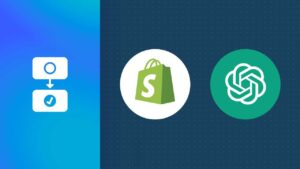This week, ChatGPT launches its Shopify integrations. What does it imply for people like me who purchase online? To discover out, I’m digging deep.
Unexpectedly, during the last six months, ChatGPT has become my go-to buying partner. It began when I was looking for a new hair dryer and couldn’t find one (I’m picky about my beauty regimen). I was so frustrated that I turned to ChatGPT for assistance. I was shocked to see how accurate the recommendations were! Since then, whenever I purchase online, I have the AI chatbot open in a tab of my browser.

I was therefore not overly surprised to learn this week that OpenAI and Shopify were collaborating. It seemed like the rest of the internet was finally catching up after the news was confirmed on Wednesday. Naturally, the AI can assist users in making quicker purchases in addition to offering excellent product recommendations.
This week, the integrations will begin to go out. How good are they, and what do they include? Let’s review the current state of the ChatGPT x Shopify integration and its implications for online purchasing going forward.
ChatGPT + Shopify Rumors
When TestingCatalog found code strings like “buy_now” and “shopify_checkout_url” in ChatGPT’s architecture, the commotion started. WinBuzzer picked it up right away, indicating that OpenAI was developing a Shopify-powered native shopping solution.
The news was thrilling. If this is accurate, we may soon be able to look for and purchase goods from within ChatGPT, eliminating the need to switch between tabs and websites. Given how many of us now rely on AI to guide our purchasing decisions, it would be a significant advancement for online shopping.
The Verification involves It’s Occurring
The business claimed to have enhanced product search results to incorporate product images, prices, and reviews in order to make it happen. There would be a purchase now link for suggested items directly within ChatGPT!
That may not seem like much, but it’s a significant change in usability. It unifies the process of finding and buying products into a single dialogue on a single platform. Bid farewell to painstakingly comparing specifications and costs and copying and pasting product names. All of it is now being handled by ChatGPT.
Read Also : CHEAPEST ELECTRIC CAR IN INDIA WITH AMT
ChatGPT Shopping: First Thoughts
This week, all Plus, Pro, Free, and logged-out ChatGPT customers worldwide will be able to take advantage of the shopping enhancements. Thus, the new functionalities are accessible to almost everyone.
What are they, next?
On OpenAI’s LinkedIn release, a video depicts a person looking for an espresso maker that costs less than $200 and makes coffee that tastes like it’s from Italy. It’s a special request that, before yesterday, would have required some very good online detective work. However, ChatGPT reacts right away with a list of items and their costs, much like what you see when you search for things on Amazon.
The user may click on each product to examine reviews and product details, and ChatGPT explains the selection process. Additionally, the customer receives many buy-now links to stores, each labeled with its price, rather than just one.

This morning, I gave it a try myself. I asked ChatGPT for a list of the top golfing devices of 2025 because I’m getting ready for Father’s Day (for both my dad and the husband). I was given a roll of items similar to the one in the LinkedIn video. The items were just what I was looking for, and I only needed to click on the ChatGPT platform to reach their purchase now page.
The first product rolls weren’t as aesthetically beautiful as I would have liked, I did notice. On my screen, I would have liked something bigger and more readable. Additionally, I discovered that by the afternoon, the function was no longer available to me, thus I was unable to try it once more before writing this article.
Shopify vs ChatGPT: Benefits and Drawbacks
Okay, so even though the Shopify x ChatGPT integration saves a ton of time and effort when purchasing, I’m worried about privacy and the possible ad industry that may result from this. Let’s say you want to get Aunt Suzy, who loves tea, the greatest kettles. Would you actually receive a list of highly regarded kettles from ChatGPT, or would it only display those that paid to be there?
Advantage: More Intelligent, Efficient Purchasing
Let’s begin with the positive. This has the potential to significantly reduce decision fatigue. Going through tabs, reading Reddit posts, comparing Amazon ratings, and searching TikTok for “mom-approved” items has taken up far too much of my time. With this connection, ChatGPT may find the exact book I’m looking for—a fantastic book to read aloud to a kindergartener—much faster.

Better still? Less clicking, less switching between applications, and more purchases I (probably) won’t regret later are all part of the “shop straight from ChatGPT” concept. In essence, it is a virtual personal shopper that refrains from attempting to upsell you at the point of sale.
Read Also : Beatbot AquaSense Pro: The Best Robotic Pool Cleaner, Just in Time for Summer
Drawbacks: Commercial Influence & Privacy
This is where things go hazy, though. Our data will be more valuable than ever if ChatGPT takes over as our shopping destination. It already knows your tastes, budget, what you’re looking for, and even who you’re buying for. A marketer would love that.
What then prevents marketers from giving promoted items precedence over highly rated ones on the platform? This has already happened with Google, where the most useful answers are frequently replaced by advertisements in the top few results. ChatGPT will lose the confidence it has earned from users who depend on it for frank assistance if it turns into a recommendation engine for the highest bidder.
Final Thoughts
I want this functionality to function since I use ChatGPT to purchase more wisely, but not at the expense of privacy and trust. Online purchasing might become more efficient and beneficial once more if OpenAI and Shopify can figure this out. Otherwise, it runs the risk of turning into simply another algorithm that tries to sell us unnecessary items.

[…] Read Also :Thanks to ChatGPT and Shopify, my shopping habits will never be the same. […]
[…] Also Read : Thanks to ChatGPT and Shopify, my shopping habits will never be the same. […]
[…] Read Also : Thanks to ChatGPT and Shopify, my shopping habits will never be the same. […]